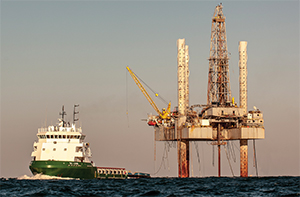Federal regulations announced in April to prevent oil spills worry energy industry members and vessel operators in the Gulf of Mexico (GOM), who say the cost of compliance will add to economic difficulties in the sector.
“The enactment of these rules couldn’t come at a worse time for the domestic energy industry,” Sarah Branch, government relations director at the Offshore Marine Service Association in New Orleans, said in May. “While most vessel operators aren’t direct parties to the well control rule, we’re all adversely affected by its negative impact on U.S. energy production.”
The Department of the Interior’s April announcement finalized rules from a year earlier and aims to improve the safety of underwater equipment and well-control operations. The rules increase controls on blowout preventers, a last line of defense against well explosions. They also toughen requirements on well designs, the linings that coat wells, and the types of fluids pumped into wells. Real-time monitoring of subsea drilling is required, as are third-party inspections.
In 2010, the Deepwater Horizon explosion off Louisiana’s coast was blamed in part on the buckling of a drill pipe, causing the blowout preventer on BP’s well to malfunction.
But the new rules could be expensive to implement. “At a time when the offshore energy industry’s doing everything it can to stay in business, we don’t need to be burdened with new regulations that don’t increase our industry’s safety, but do greatly increase the cost of doing business,” Branch said. “Being forced to live with the well-control rule will only cause valuable investments to be made in overseas markets and will add to American job losses.”
In an Oct. 1, 2015, letter to the Department of the Interior, ExxonMobil said implementing the new rules could cost offshore oil operators more than $25 billion over 10 years, including more than $11 billion to meet blowout preventer requirements. Federal officials, meanwhile, have projected the industry’s total costs from the new regulations to be less than $1 billion.
ExxonMobil, one of the large leaseholders in the deepwater Gulf, said the rules will jeopardize safety. Making onshore decisions from real-time data centers could reduce the authority of offshore workers, who are key to keeping drilling safe and responding to emergencies, according to ExxonMobil. Some rock formations won’t be able to handle the government’s required drilling fluids, the company said, and a rule requiring cement around the steel pipe lining a well could increase threats from air pockets and cracks.
In the past year, the Gulf Coast has suffered steep losses in oil-related income and jobs, particularly in shallow-water operations. “The industry is so decimated right now because of low oil prices and government regulations that any increase in operations costs will result in less activity in the GOM,” David Barousse, general manager at Fleet Operators Inc. in Morgan City, La., predicted last spring. Fleet Operators has provided marine transportation to the Gulf oil and gas industry for 30 years.
But federal regulators believe the new drilling rules are needed, especially since additional deadly blowouts have occurred in the Gulf since BP’s 2010 well explosion that killed 11 workers and spilled millions of gallons of crude. On April 14 of this year, Interior Secretary Sally Jewell said the new well-control rule will be vital to modernizing the nation’s offshore energy program.
The new rules, based on lessons from the BP spill, incorporate advice from studies and from the Department of the Interior’s consultations with other federal agencies, industry groups, equipment manufacturers, universities and environmentalists. Reports from the National Oil Spill Commission; Bureau of Ocean Energy Management, Regulation and Enforcement; U.S. Coast Guard; and the National Academy of Engineering, along with documents from the Ocean Energy Safety Advisory Committee, were all considered. Looking ahead, the Interior Department said the new rules will provide enough flexibility so that government oversight can keep pace with changes in technology.
As for environmental groups, they’re worried the new drilling rules don’t do enough to protect marine life.

